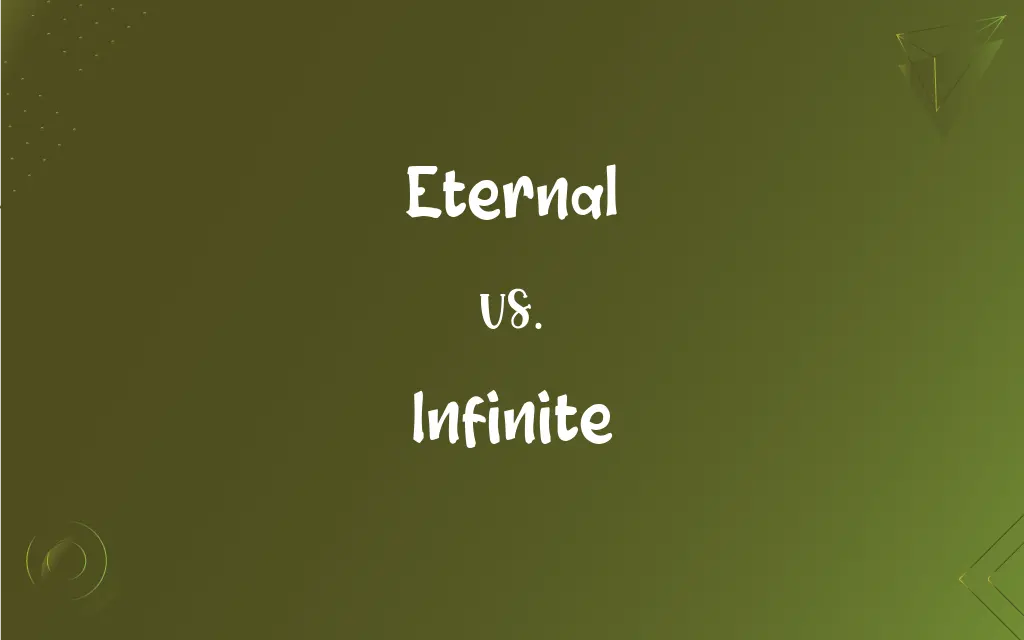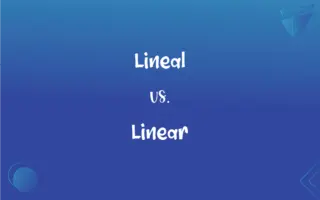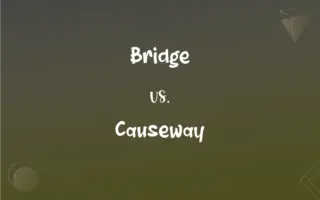Eternal vs. Infinite: What's the Difference?
Edited by Aimie Carlson || By Harlon Moss || Updated on November 7, 2023
Eternal means lasting forever, without end in time; infinite means limitless or endless in space, extent, or size.

Key Differences
Eternal is often used in the context of time, referring to something that has no beginning or end. It conveys the idea of perpetual existence. Infinite, however, is a term that is used to describe something without any limits in terms of quantity or extent. When something is eternal, it transcends time itself, like the concept of eternal love or the eternal soul in many philosophical and religious texts.
Infinite is more frequently applied to concepts of space, size, or number. For example, the universe is often described as infinite, indicating that it is boundless or immeasurable. While eternal continues in a temporal sequence indefinitely, infinite spreads out in all directions, potentially encompassing an endless array of possibilities or magnitudes.
Eternal and infinite can intersect in their meanings but are not interchangeable. An eternal being, for example, would exist for an infinite amount of time but not necessarily have infinite attributes in other respects. Conversely, infinite resources do not deplete over time, but this does not imply they exist outside the bounds of time altogether.
The concept of eternity has a more pronounced place in discussions of life, death, and the metaphysical. It often carries a qualitative aspect, emphasizing the unchanging nature of something. Infinite, in contrast, is quantitative, suggesting an uncountable or immeasurable amount or degree, often used in mathematics and the sciences.
Eternal life would mean life without the end of existence, a concept found in many religions. An infinite number of stars suggests a quantity beyond counting, demonstrating the word's usage in astronomy. Thus, while both words deal with the absence of limits, eternal leans toward temporal concepts, and infinite leans toward spatial or numerical concepts.
ADVERTISEMENT
Comparison Chart
Definition
Without end in time.
Without limits in space, quantity, or size.
Usage in Context
Temporal continuity, often philosophical.
Spatial or quantitative expansiveness, often mathematical.
Implies
Permanence, immortality.
Endlessness, boundlessness.
Common Associations
Life, existence, divinity.
Space, numbers, possibilities.
Example
Eternal love.
Infinite space.
ADVERTISEMENT
Eternal and Infinite Definitions
Eternal
Lasting or existing forever.
They believed in the promise of eternal life.
Infinite
Limitless in extent or size.
The night sky seemed to offer infinite stars.
Eternal
Without beginning or end.
The eternal universe is a concept in some cosmologies.
Infinite
Immeasurably great or large.
Her patience with the students was infinite.
Eternal
Unchanging over time.
Her memory will remain eternal in our hearts.
Infinite
Greater than any assignable quantity or countable number.
The mathematical concept of infinite series fascinates her.
Eternal
Continuing indefinitely in the future.
He spoke of their friendship as an eternal bond.
Infinite
Without any limits, boundless.
He had an infinite capacity for learning.
Eternal
Perpetually valid or true.
Some consider mathematical truths to be eternal.
Infinite
Endlessly numerous.
There are infinite solutions to the problem.
Eternal
Being without beginning or end
Belief in an eternal creator.
Infinite
Having no boundaries or limits; impossible to measure or calculate.
Eternal
Continuing without interruption; perpetual
Earned my eternal gratitude.
Infinite
Immeasurably great or large; boundless
Infinite patience.
A discovery of infinite importance.
FAQs
What does "eternal" mean?
"Eternal" refers to something that lasts forever, without beginning or end.
Can "infinite" be used to describe time?
Yes, it can describe time that extends endlessly.
Is "eternal" always related to time?
Primarily, yes, it pertains to an unending duration.
Is "eternal" used in religious contexts?
Yes, it's often used to describe the divine or afterlife.
How is "eternal" used in a sentence?
"The stars are often considered symbols of eternal beauty."
What does "infinite" mean?
"Infinite" describes something without any limits or an unending quantity.
What is the difference between "eternal" and "everlasting"?
"Eternal" implies no beginning or end, while "everlasting" means lasting forever but having a beginning.
Can "infinite" describe possibilities or variations?
Yes, it can refer to endless possibilities or variations.
Can "eternal" describe love or other emotions?
Yes, it can describe feelings that are perceived to last forever.
What is an example of something infinite?
The universe is often considered infinite in its expanse.
What is "infinitude"?
"Infinitude" refers to the state of being infinite or having an infinite number of elements.
How do you pronounce "eternal"?
"Eternal" is pronounced as \i-ˈtər-nəl.
How do you pronounce "infinite"?
"Infinite" is pronounced as \ˈin-fə-nət.
How is "infinite" used in mathematics?
In mathematics, "infinite" refers to a quantity without bound or end.
Can "eternal" and "infinite" be used interchangeably?
They are not always interchangeable as "eternal" often relates to time, while "infinite" refers to any unlimited quantity.
Does "infinite" have a noun form?
Yes, the noun form is "infinity."
Are "eternal" and "infinite" scientific terms?
They can be used in scientific contexts but are often associated with philosophical or theoretical concepts.
What is "eternity"?
"Eternity" is the state of existing forever, in a timeless state.
Can objects be described as "eternal"?
Objects can be described as "eternal" in a symbolic or metaphorical sense, but all physical objects have a finite existence in reality.
Is "infinite" only a theoretical concept?
While often theoretical, it can also describe real-world concepts that are immeasurable.
About Author
Written by
Harlon MossHarlon is a seasoned quality moderator and accomplished content writer for Difference Wiki. An alumnus of the prestigious University of California, he earned his degree in Computer Science. Leveraging his academic background, Harlon brings a meticulous and informed perspective to his work, ensuring content accuracy and excellence.
Edited by
Aimie CarlsonAimie Carlson, holding a master's degree in English literature, is a fervent English language enthusiast. She lends her writing talents to Difference Wiki, a prominent website that specializes in comparisons, offering readers insightful analyses that both captivate and inform.































































